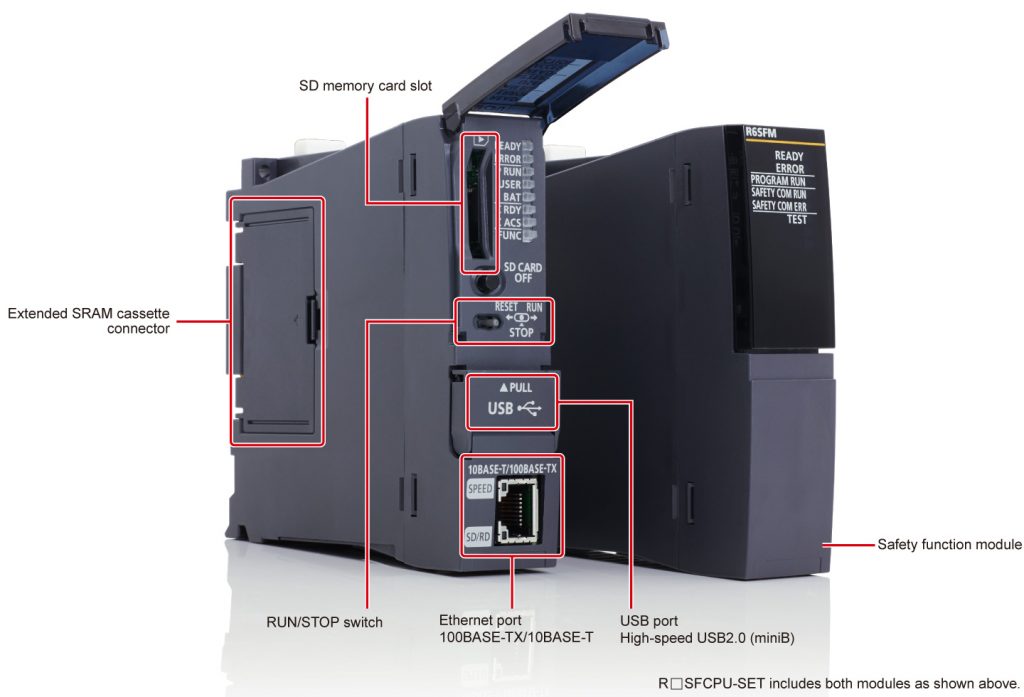1. EXECUTIVE SUMMARY
- CVSS v3 6.5
- ATTENTION: Exploitable remotely/low attack complexity
- Vendor: Mitsubishi Electric
- Equipment: MELSEC iQ-R Series Safety CPU and SIL2 Process CPU Module
- Vulnerability: Incorrect Privilege Assignment
2. RISK EVALUATION
Successful exploitation of this vulnerability could allow a non-administrator user to disclose the credentials (user ID and password) of a user with a lower access level than themselves.
3. TECHNICAL DETAILS
3.1 AFFECTED PRODUCTS
Mitsubishi Electric reports that the following MELSEC iQ-R Series products are affected:
- MELSEC iQ-R Series Safety CPU R08SFCPU: All versions
- MELSEC iQ-R Series Safety CPU R16SFCPU: All versions
- MELSEC iQ-R Series Safety CPU R32SFCPU: All versions
- MELSEC iQ-R Series Safety CPU R120SFCPU: All versions
- MELSEC iQ-R Series SIL2 Process CPU R08PSFCPU: All versions
- MELSEC iQ-R Series SIL2 Process CPU R16PSFCPU: All versions
- MELSEC iQ-R Series SIL2 Process CPU R32PSFCPU: All versions
- MELSEC iQ-R Series SIL2 Process CPU R120PSFCPU: All versions
3.2 Vulnerability Overview
3.2.1 INCORRECT PRIVILEGE ASSIGNMENT CWE-266
Information disclosure vulnerability due to incorrect privilege assignment exists in MELSEC iQ-R Series Safety CPU and SIL2 Process CPU modules. After a remote attacker logs into the CPU module as a non-administrator user, the attacker may disclose the credentials (user ID and password) of a user with a lower access level than the attacker by sending a specially crafted packet.
CVE-2023-6815 has been assigned to this vulnerability. A CVSS v3.1 base score of 6.5 has been calculated; the CVSS vector string is (AV:N/AC:L/PR:L/UI:N/S:U/C:H/I:N/A:N).
3.3 BACKGROUND
- CRITICAL INFRASTRUCTURE SECTORS: Critical Manufacturing
- COUNTRIES/AREAS DEPLOYED: Worldwide
- COMPANY HEADQUARTERS LOCATION: Japan
3.4 RESEARCHER
Reid Wightman of Dragos Inc. reported this vulnerability to Mitsubishi Electric.
4. MITIGATIONS
When MELSEC iQ-R Series Safety CPU versions 27 or later is used with GX Works3 versions 1.087R or later, this attack can be prevented by enabling “communicating with only the enhanced version of vulnerability management of GX Works3” when writing user information to the CPU module. Mitsubishi Electric will implement the workaround in other products in the near future. Please contact your local Mitsubishi Electric representative to update your CPU module to the one listed above.
Mitsubishi Electric recommends that users take the following mitigation measures to minimize the risk of exploiting this vulnerability:
- Use a firewall or virtual private network (VPN), etc., to prevent unauthorized access when Internet access is required.
- Use within a LAN and block access from untrusted networks and hosts through firewalls.
- Use IP filter function to block access from untrusted hosts. For details on the IP filter function, please refer to the following manual for each product. “1.13 Security” – “IP filter” in the MELSEC iQ-R Ethernet User’s Manual (Application).
- Restrict physical access to the affected product as well as to the personal computers and the network devices that can communicate with it.
- Install antivirus software on your personal computer that can access the affected product.
For specific update instructions and additional details, see Mitsubishi Electric advisory 2023-021.
CISA recommends users take defensive measures to minimize the risk of exploitation of this vulnerability. CISA reminds organizations to perform proper impact analysis and risk assessment prior to deploying defensive measures.
CISA also provides a section for control systems security recommended practices on the ICS webpage on cisa.gov/ics. Several CISA products detailing cyber defense best practices are available for reading and download, including Improving Industrial Control Systems Cybersecurity with Defense-in-Depth Strategies.
CISA encourages organizations to implement recommended cybersecurity strategies for proactive defense of ICS assets.
Additional mitigation guidance and recommended practices are publicly available on the ICS webpage at cisa.gov/ics in the technical information paper, ICS-TIP-12-146-01B–Targeted Cyber Intrusion Detection and Mitigation Strategies.
Organizations observing suspected malicious activity should follow established internal procedures and report findings to CISA for tracking and correlation against other incidents.
No known public exploitation specifically targeting this vulnerability has been reported to CISA at this time.
Source:
